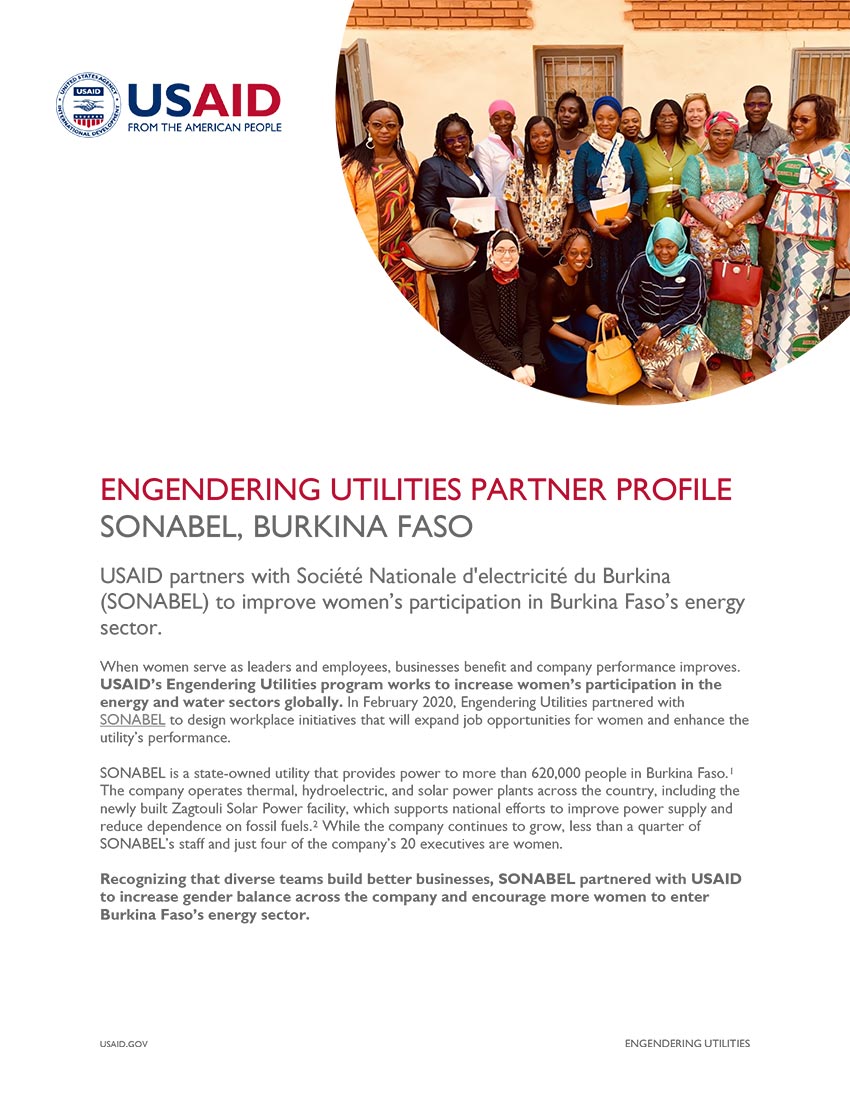- Energy Home
- How We Work
- Programs & Initiatives
- Smart Utilities
- Asia EDGE
- Auction Design Support to Colombia
- Energy Auctions for Kazakhstan’s Green Economy
- Energy Efficiency for Development
- Engendering Utilities
- About
- Business Case
- Approach
- Partners
- OSHEE, Albania
- SONABEL, Burkina Faso
- EDESUR, Dominican Republic
- DELSUR, El Salvador
- EEU, Ethiopia
- Energo-Pro, Georgia
- GRIDCo, Ghana
- BRPL, India
- TPDDL, India
- EDCO, Jordan
- IDECO, Jordan
- Miyahuna, Jordan
- KenGen, Kenya
- Kenya Power
- KOSTT, Kosovo
- LEC, Lesotho
- LEC, Liberia
- EGENCO, Malawi
- EDM, Mozambique
- EKEDC, Nigeria
- IBEDC, Nigeria
- ISWSC, Nigeria
- EVN, North Macedonia
- LASURECO, Philippines
- ZCWD, Philippines
- REG, Rwanda
- OFOR, Senegal
- Senelec, Senegal
- EVN, Vietnam
- Resources
- Stories
- Institutional Framework for Auctions in Mexico
- Powering Agriculture
- The USAID-NREL Partnership
- Scaling Up Renewable Energy
- EmPOWERing Women and Girls
- Competitive Energy Procurement
- Toolkits
- Monitoring & Evaluation
- Resources
- Stories
Speeches Shim
Engendering Utilities Partner Profile
State-owned SONABEL provides power to more than 620,000 people in Burkina Faso and operates thermal, hydroelectric, and solar power plants across the country. Less than a quarter of SONABEL’s staff and only four of the company’s 20 executives are women.
The cost of electricity in Burkina Faso is one of the highest in West Africa, and only one in four people have access to electricity. The country relies on significant electricity imports from Côte d'Ivoire due to low levels of domestic power production compared to other countries in the region. Having success with the country’s first solar power plant, the government plans to build additional plants to increase access to power to 95 percent by 2025, achieve 50 percent renewable energy by 2030, and export oil and gas to other countries in the future. Engendering Utilities’ work with SONABEL will ensure women can capitalize on increased investment in Burkina Faso’s energy sector as the industry and labor force continue to grow.
A complex web of contributing factors prevents women in Burkina Faso from joining the formal workforce, particularly the male-dominated energy sector. While 60 percent of women participate in the workforce in Burkina Faso, they hold lower-quality jobs, have less diverse employment opportunities, and earn less than men. National laws, cultural practices, and gender norms limit opportunities for women and impact their ability to join the formal workforce. Engendering Utilities is supporting SONABEL to consider and respond to factors that reduce women’s workforce participation by building inclusive policies and practices that benefit men, women, and businesses in the energy sector.
USAID is supporting SONABEL in its goal of increasing gender equality across the company’s business practices by providing change management coaching and leadership training, conducting a baseline assessment to identify gaps and opportunities for gender equality, and developing a strategic plan with SONABEL to facilitate the company’s gender equality goals.
USAID will support and accelerate gender equality initiatives already underway at SONABEL as part of the broader strategic action plan, including:
- Mutelle des Femmes, a network that connects women at SONABEL with professional development opportunities and a social network of women employed in the energy sector.
- Development of a Male Engagement Strategy, which identifies and supports male leaders as champions of gender equality at SONABEL.
- Professional Skills Training Program, which builds the skills of female candidates who applied for vacant positions, but lacked the experience required. The program will increase the qualifications of prospective employees, making them more competitive for future openings.


Comment
Make a general inquiry or suggest an improvement.